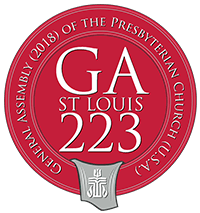 The Mission Coordination Committee of the General Assembly considers:
The Mission Coordination Committee of the General Assembly considers:
“Mission programs authorized by General Assembly; PC(USA) vision and mission goals; Organization for Mission and General Assembly Mission Council Manual of Operations; mission budget; audits; churchwide compensation; initiatives on church growth and the 1001 Worshiping Communities program.” (Source: www.pc-biz.org).
Topics Addressed:
- The Presbyterian Mission Agency
- Determining the Need for an LGBTQ+ Advocacy Committee
- The PMA 2019-20 Mission Work Plan
- Creating a Department for Small Church Mission
- Confirming the election of Rev. Dr. Diane Givens Moffett as President/Executive Director of PMA
- Presbyterian Mission Agency Budget
- PMAB Items transferred to The Way Forward Committee [04]
- Listening to and Supporting Native American Voices
- Institutional Relationships and the List of PC(USA)-Affiliated Schools
- Serious Mental Illness
- The Role of the Humanities
- Presbyterian Church (U.S.A.), A Corporation (“A Corp”)
- Awards
Contributor Responses:
Comfort My People: Shining a Light at GA 223, Josh Robinson
Abbreviations Used:
A Corp—Presbyterian Church (U.S.A.), A Corporation
ACREC—Advocacy Committee for Racial Ethnic Concerns
ACSWP—Advisory Committee for Social Witness Policy
ACWC—Advocacy Committee for Women’s Concerns
COTE—Committee on Theological Education
GACOR—General Assembly Committee on Representation.
GANC—General Assembly Nominating Committee
HPREI—Historically Presbyterian Racial Ethnic Institution
PMAB—Presbyterian Mission Agency Board
PW—Presbyterian Women
WFC—Way Forward Commission
Presbyterian Mission Agency
[10-03]: Determining the Need for an LGBTQ+ Advocacy Committee
ACWC recommends that a five-person task force be created to study whether a new “advocacy committee on gender and identity matters” should be formed. The recommendation also directs GANC to ensure that “diversity of sexual identity and gender identity” is considered in its nominating process.
The overture is supported by ACSWP, ACREC, and GACOR. ACSWP acknowledged that “LGBTQ+ persons still face exclusion and discrimination within the PC(USA) and the broader society,” ACREC made the recommendation “that the unique intersectional issues related to race and gender identity/sexual orientation be taken into account in this work,” and GACOR “supports a process through which the denomination can seek ways to represent the denomination’s full diversity within its decision-making bodies and processes.”
[10-04]: The PMA 2019-20 Mission Work Plan
Past PMA work plans are available for reference: 2013-2016 (https://www.pc-biz.org/#/search/3975) and 2017-2018 (https://www.pc-biz.org/#/search/3000136). Those past plans, as the proposed interim plan for 2019-2020, focus on broad emphases behind which to unite the PMA. This year’s plan emphasizes congregational vitality and fighting against the unjust systems underpinning poverty, white supremacy, and structural racism.
ACREC and ACWC both advise approval of the plan, but each comments that now is a time to wrestle also with the “violence against” and “delayed justice for” women.
WFC advises the GA to “review with care,” concurring with the emphases but contending that “the document contains no plan for addressing these issues.” (This is true, though past Mission Work Plans have not served that function—see the past MWPs linked above). WFC recommends that the General Assembly direct PMAB to:
“(a) direct the PMAB to develop a detailed work plan within ninety days of the close of the General Assembly;
(b) confirm that its budget contains all expenditures expected to be made by the PMA for that work plan and the operations of the PMA; and
(c) report these items for review and approval to the Moving Forward Implementation Commission.” (WFC recommends the creation of this commission in Item [04-03], Recommendation 5).
[10-09]: Creating a Department for Small Church Mission
This overture from the Presbytery of Grace directs the PMA to develop a department dedicated to supporting small church ministry and mission, including a full-time director, a second full-time staff person, and support staff.
ACWC supports the overture, stating: “The majority of women clergy serve small congregations and lack the necessary support for shaping congregational mission and ministry.”
The PMA does not explicitly take a position for or against the founding of a department, but affirms the goal of the overture before listing a few detracting points:
- To start, PMA points out that “the Presbyterian Mission Agency is currently staffed for and engaged in a wide range of ministries designed to partner with small congregations,” in particular mentioning the Vital Congregations initiative and 1001 New Worshiping Communities (NWC).
- PMA also indicates that this overture, if approved, would require the elimination of multiple programs within the PMA mission budget.
- Finally, PMA cautions: “The staffing it calls for creating would be organized on the basis of the size of congregations, and would be at odds with present staffing structures that seek to bring needed support and expertise to a variety of sizes of congregation as they face similar challenges…”
[10-14]: Confirming the election of Rev. Dr. Diane Givens Moffett as President/Executive Director of PMA
Rev. Dr. Diane Givens Moffett is recommended by unanimous vote of the PMA Search Committee. The rationale for the recommendation includes a description of the search process, as well as several peer quotes endorsing Dr. Moffett.
[10-15]: Presbyterian Mission Agency Budget
The PMA budget report finalizes budget and special offering reports for 2016 and 2017, updates the 2018 budget, and recommends the 2019 and 2020 budgets for approval. It also recommends that the 223rd General Assembly (2018) allocate income in 2017 and projected for 2018 from the John C. Lord and Edmund P. Dwight Funds toward the general mission work of PMA. The report includes five budget charts (links below).
- Actual Revenue & Expenditures for 2016 and 2017
- Revised 2016 PMA Budget
- Report of 2017 PMA Budget & Program; 2018 PMA Budget
- Report of 2018 A Corp Unrestricted & Restricted Net Assets
- Summary of receipts for Special Offerings in 2016 and 2017
PMAB Items Transferred to The Way Forward Committee [04]
(Commentary is available on our page on The Way Forward Committee, linked above).
[10-07]: On Amending the Order for Mission (Moved to [04-08])
[10-08]: Changes to the PMAB Manual of Operations (Moved to [04-09])
Listening to and Supporting Native American Voices
[10-01]: Repairing the Critical Infrastructure of Native American and Alaskan Native churches
This overture would direct the Presbyterian Mission Agency (erroneously named General Assembly Mission Agency, its previous name) to inventory the needs of ninety-eight Native American member churches of the PC(USA) and create an “ongoing fund for urgent and immediate repairs and improvements,” citing the history of missionary-constructed churches and naming a “fundamental responsibility to maintain what we built.”
ACREC recommends approval, echoing the language of a “fundamental responsibility” and recognizing the need to allocate financial resources to “address the racial financial equity among people of color members of the PC(USA).
GACOR supports the overture as well, noting that “Native Americans and Alaskan Native Americans have suffered from the ongoing effects of colonization, both within and outside of the larger church.”
The Foundation “welcomes the opportunity to be part of the funding discussion for this worthy initiative” and writes that it “will gladly conduct research regarding funds given for the purpose of Native American and Alaskan Native missions.”
Responses to the Doctrine of Discovery
[10-12]: Expanded response to the Doctrine of Discovery
[10-13]: Doctrine of Discovery Report
These two items both concern the Doctrine of Discovery, but represent different points along the path of following up on the 2016 resolution repudiating the Doctrine. One might say that they are numbered in “backwards” order, thematically:
- [10-13] is the report from the Doctrine of Discovery Team (recommended to GA by the PMAB). The team has done a study that covers the historical context of the doctrine and recommends a number of further educational resources and actions by the PMA, Presbyterian Historical Society, and PC(USA) schools and seminaries. (Also recommended is directing Unbound to devote an issue to the Doctrine of Discovery). The report also recommends directing that the General Assembly, agencies of the church, and mid councils begin each meeting with a recognition of whose land they are meeting on.
- [10-12] starts its rationale by writing: “The committee tasked to author the report to the 223rd General Assembly (2018) of the PC(USA) was limited in the recommendations it was authorized to produce. The committee was limited primarily by the wording of its mandate, but also to a significant degree by the fact that the import and depth of this study only emerged slowly as the committee pursued its work.” It continues to list three reasons that further response is needed:
1. The Need for Recommendations to More Than Just Congregations
2. There Is a Need for Acts of Justice That Only Come Through a Journey of Repentance
3. Acts of Justice and Wholeness Are Needed within the PC(USA) and in the Wider Community
The [10-12] recommendations overlap in some places with [10-13], but make a point of emphasizing that resources should aim to aid congregations, mid councils, and the national church. However, some specific actions mentioned in [10-13] are excluded in [10-12], and the points are organized differently.
ACREC endorses both [10-12] and [10-13], writing that “The hope of ACREC is that these recommendations [in [10-13]] will not merely be endorsed and approved by this General Assembly, but that this would be a call to the church to repent, to turn, to take action in a new direction together with our Native American siblings.”
GACOR “supports efforts to educate and provide reparation to the damage caused by past activities and laws affecting Native Americans and other marginalized persons” and
mentions that “including [committees on representation] in mid council efforts to address these long-ignored harms and peoples would be helpful.” It comments on both resolutions, emphasizing across its two comments the church’s historical role in theologically justifying unjust and idolatrous actions.
ACSWP advises approval of [10-13]: “This is a very good study, summarizing a large amount of historical and legal material. It makes clear that the “Doctrine” was at its earliest stages the product of a time when church and state were not separate.”
ACWC also advises approval of [10-13], writing that “The claims made by the Doctrine of Discovery and Manifest Destiny continue to undergird white supremacy and patriarchy today and Western culture still assumes itself to be the defining culture. Even [the] concept of “inclusivity” reinforces privilege when applied universally with the intention of including everyone in the dominant (European American/White) worldview […] it is possible to choose another path, replace the colonial doctrine of Discovery with contemporary international standards of human rights and engage in a dialogue with difference rather than its subjugation.”
COTE advises that the language of [10-13] be revised to be consistent when referring to Presbyterian-affiliated schools and seminaries, perhaps with the phrase “COTE-member seminaries,” and notes that its own function is to be the vehicle for communication to seminaries (and goes unmentioned in the resolution, as well as in [10-12]).
Institutional Relationships and the list of PC(USA)-Affiliated Schools
[10-05]: Institutional Relationship between the General Assembly and Historically Presbyterian Racial Ethnic Institutions (HPREIs)
The Menaul School, Presbyterian Pan American School, and Stillman College are “three racial ethnic educational institutions [that] continue to relate directly to the General Assembly through an institutional relationship agreement.” This agreement would re-affirm that connection, and includes a list of mutual responsibilities that includes communication, relationship-building, support for mission, and the responsible stewardship of resources.
ACREC writes in support of [10-05]: “As the church of Jesus Christ, we are called to promote justice and advocate for the marginalized. The support and advocating for the mission of HPREIs easily falls within the parameters.”
[10-06]: Institutional Relationship between Presbyterian Women (PW) and the Presbyterian Mission Agency Board
“PW is a tax-exempt national women’s organization related to the Presbyterian Church (U.S.A.), hereinafter PC(USA). Its members are, first and foremost, members of the PC(USA).”
This agreement re-affirms the “long-standing partnership” between PW and the PMA, and lays out covenantal responsibilities of each party that include a mutual support for the church’s mission; the recognition of PW as an autonomous, separate corporation; a full voice and vote member from each group on the other’s. board; and the continued work of collaborative women’s ministries as a focus of the PMA.
ACWC writes in support of [10-06], citing PW’s status as “the oldest and largest mission partner of the PC(USA),” as “on the leading edge of justice and peace work for women and children,” and as the provider of “more than $60 million dollars in grants for PC(USA) partners since 1988”
[10-10]: A PMAB-recommended list of colleges, universities, and secondary schools to be approved as “those related to the Presbyterian Church (U.S.A.)”
The rationale states: “The criteria for being included on this list is that the institutions can identify a historic connection to the PC(USA) and demonstrate a commitment to Reformed values through the education they provide. Among these values are a commitment to faith, truth, learning, service, community, character, and the dignity and worth of each person.”
Serious Mental Illness
[10-11]: Following through on Comfort My People (2008)
10 years after the adoption of Comfort My People, this overture calls for updating the document and establishing a $250,000 grant to educate & reduce the stigma around serious mental illness.
The Presbytery of Newton writes in support and advocates that the grant be expanded to $1 million.
ACSWP recommends approval with amendments, offering structural advice that the overture be implemented by hiring staff within the Compassion, Peace and Justice department of the PMA, who as part of their work could review potential Foundation endowments and grants which could be used to create a fund of up to $1 million, the amount proposed by the Presbytery of Newton’s concurrence. (This recommendation comes with significant line edits to the initial overture).
ACREC recommends approval, quoting Comfort my People at length and noting the “clear racial justice implications of addressing with mental health.”
ACWC also recommends approval, and notes a similar “intersection of mental illness and gender justice,” with reference to an article from Psychology Today that indicated the higher depression among women, correlated with forms of trauma including sexual assault or domestic abuse.
Comfort My People: Shining a Light at GA 223, Josh Robinson
The Role of the Humanities
[10-02]: Collaborative Study of the Place and Purpose of the Humanities in PC(USA) Liberal Arts Colleges and Universities
This overture would create a four-year, cross-disciplinary task force, with 7-10 members “drawn from faculty, administrators, and chaplains at related Presbyterian-affiliated colleges and universities” and appointed through collaboration among TFE, ACSWP, and the moderators of the 2016 and 2018 General Assemblies. The rationale begins by stating that “Church-related liberal arts colleges in America represent a living endorsement and modification of classical humanistic approaches to higher education.”
ACSWP urges approval: “This overture makes a strong case for teaching humanities from a Christian faith perspective, and clearly relates that teaching to the vitality of faith on college and university campuses […] Today’s trends are not good for either religion or the humanities, but there may be an advantage to be claimed for PC(USA) institutions that have linked the two in their past educational goals.”
A Corp
These are the reports from “Presbyterian Church (U.S.A.), A Corporation,” colloquially known as “A Corp.”
[10-C] A Corp Minutes [not up as of 06-12]
[10-D] A Corp Audit
A copy of the independent auditor’s report as of December 31, 2017.
[10-info] Bylaw Changes to A Corp
This is a report of changes to the bylaws of A Corp, which do not require approval by the General Assembly.
Awards
[10-A] Sam and Helen Walton Awards
These awards recognize the recipients of “outstanding new church developments” in commemoration of a gift to the Foundation by Sam and Helen Walton. In [10-A] the PMAB reports the the 2016 and 2017 awards and recommends that the GA recognize the recipients.
[10-B] Women of Faith Award Recipients
“The Women of Faith Awards were established in 1986 to honor women in the Presbyterian Church (U.S.A.) whose lives exemplify their Christian commitment through witness, service, and leadership.” In [10-B] the PMAB recommends that the General Assembly recognize the three women selected to be honored at the Women of Faith breakfast.
The 223rd General Assembly Women of Faith Award recipients are:
The Reverend Samantha Barbee
The Reverend Karen Hernandez-Granzen
The Reverend Liz Theoharis
***
This outline was compiled by Henry Koenig Stone, who serves in Louisville, KY as current Managing Editor of Unbound and as Associate for Young Adult Social Witness (staff to ACSWP). Henry holds a B.A. in Economics (2015) from the University of Chicago and an MPP (2017) from UChicago’s Harris School of Public Policy. His past work has focused on policy analyses of healthcare pilot programs and public health systems.






Unbound Social